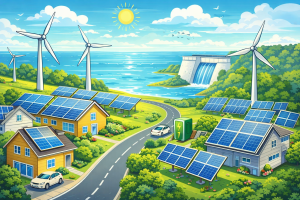Jakarta – New research by the International Institute for Applied Systems Analysis (IIASA) in Austria reveals that a decent standard of living can be achieved without drastically increasing global energy consumption. In fact, under a sustainable development scenario, energy consumption could be reduced below current minimum requirements.
The study, published in the journal Environmental Research Letters, uses a new model called DESIRE (Decent Energy System for Integrated and Regenerative Economies), and maps out the minimum energy requirements to fulfil basic services such as health, education, housing, and transport, while adhering to global climate targets under the Paris Agreement.
“With climate change and billions of people still lacking basic needs, addressing these two issues simultaneously is not only possible, but also critical,” IIASA wrote in an official release on Friday, 16 May.
One of the study’s most striking findings is that future global energy demand could be reduced to a third of today’s total without compromising the quality of human life. In a scenario prioritised for sustainable development, the number of people worldwide without access to adequate energy could fall by more than 90 per cent—a much faster decline than in a “business as usual” scenario.
Another astonishing fact is that the carbon emissions needed to support a decent life globally are actually much smaller than current emissions. This shows that technological efficiency and a more equitable distribution of resources play important roles in reducing the carbon footprint.
The study also highlighted that only about 33 per cent of global energy consumption is used for basic needs. The remaining two-thirds is used for needs considered excess or not directly related to a decent standard of living. (Hartatik)
Banner photo: Image generated by OpenAI’s DALL·E via ChatGPT (2024)














